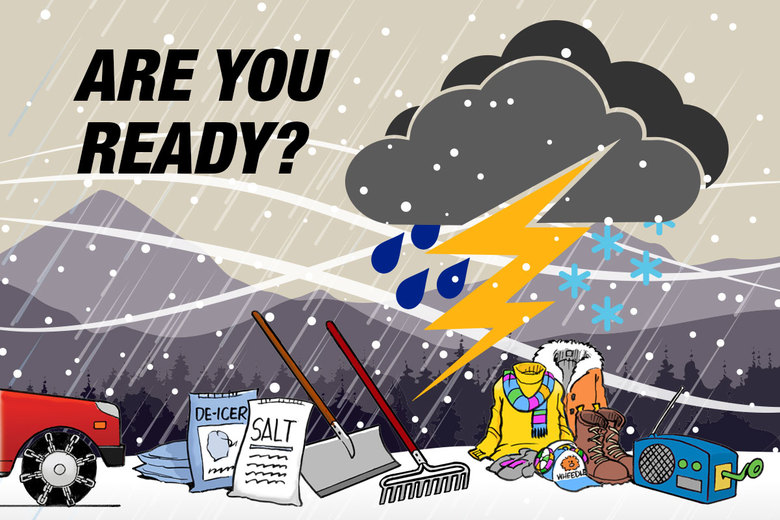Winter storms can bring snow, sleet and freezing rain across the entire United States and its territories. Even Hawaii can get snow on the Big Island, and major cities as far south as Atlanta and Dallas have been paralyzed by snow and ice. Winter weather knocks out heat, power and communications, and can cause serious accidents due to icy conditions. The dangerously low temperatures can also cause hypothermia and frostbite if an individual is left in the cold for too long.
Winter storms can last for several days and carry freezing rain, ice, moderate to heavy snowfall, or blizzard conditions. Learn how to prepare for the winter season by following the tips below.
General Precautions
- Listen to local officials.
- Have emergency supplies at home, work, and in the car.
- Stay off the road during and after a winter storm.
- Have a carbon monoxide alarm in place, especially if using alternative heating devices.
- Place heating devices in a safe location.
- Talk with your family about how to get prepared for extreme cold weather.
- Make a plan to connect before a winter storm.
- Check on family, friends and neighbors, especially if they are elderly.
- Charge cell phones. Keep a portable charger ready for use. Reduce the screen brightness and close apps not in use to conserve battery.
- Find flashlights and radios (check batteries).
- Run a hot bath to draw in heat to the house.
- Trickle water to prevent the pipes from freezing.
- Talk to your job about weather policies and procedures.
- Bring your furry friends inside when temperatures take a dip and wipe paws to remove ice-melting chemicals or rock salt.
Outdoors and Traveling
The danger of winter driving doesn’t just happen during the holidays, it happens all season. You should stay home when a winter storm is passing through. Try to stay off icy roads when winter storm advisories and watches are issued. If you do hit the road or go outdoors, here are some reminders to help you stay safe and warm.
- Pace yourself; shoveling can cause heart attacks.
- Clear snow and ice off of fire hydrants so fire departments can gain access.
- Prepare your car or truck for winter – use adequate tires, tire chains, shovel, tool kit, windshield scraper and brush.
- Build or update a car emergency kit.
- Wear layers of loose-fitting, lightweight clothing to keep you warm.
- “Don’t crowd the plow!”
- Take it slow; drive with slower speed, slower acceleration, slower steering and slower braking.
- Keep your gas tank near full to help avoid ice in the tank and fuel lines.
- Stay on main roads and highways and stick to the flattest roads you can. Avoid hills and roads with sloping surfaces wherever possible.
- Drive only during daylight hours and avoid driving alone if you can.
- Let family members know where you’re going and when you’re expected to return.
If a snowstorm or blizzard forces you to stop, pull off the highway and turn on your hazard lights. If you have a distress flag or sticker, hang it from your radio antenna or apply it to your window. Remain in your car, where rescuers are most likely to find you. If you’re stranded for an extended period of time, run your engine for about 10 minutes every hour to stay warm. Open a window slightly for ventilation while the car is running to prevent any carbon monoxide buildup. Remove any snow that builds up on your car’s exhaust pipe. Exercise periodically by vigorously moving arms, legs, toes and fingers. If you have to spend the night in your car, turn on the interior overhead light so rescuers or work crews can see you.
Heating
- Keep anything that can burn at least 3 feet away from a fireplace, wood stove or space heater.
- NEVER use a generator, camp stove, charcoal grill, gasoline or propane heater indoors.
- NEVER heat a home by using the stovetop or oven.
- Keep generators outside at least 20 feet away from doors, windows and vents to avoid accidental CO poisoning.
- Wear layered clothing and use blankets to stay warm during a winter storm.
- Space heater
- Make sure it has an auto shut-off in case it tips over.
- Purchase and use only heaters that have the label of a recognized testing laboratory.
- Fireplace and Wood Stove
- Keep a metal or heat tempered screen around it.
- Do not burn paper in your fireplace or wood stove.
- Put the fire out before you go to sleep or leave your home.
- Have your chimney inspected and cleaned each year by a professional.
- Put ashes in a metal container with a lid. Place the container outside at least 10 feet from your home.
Power Outage
Ice storms and blizzards can snap power lines just as easily as any hurricane, spawning prolonged power outages during the darkest days of the year. To better prepare you and your family, consider the following items.
- Have a backup generator.
- Protect your generator with a cover.
- Install a manual transfer switch.
- Set a temperature alarm to prevent the water pipes from freezing.
- Keep a snowblower ready.
Taking the time to prepare for a winter storm can mean the difference between comfortably riding it out or barely surviving. It is highly recommended that you go through the checklist to see if you are prepared. Don’t get stuck in the cold! For more helpful resources, please see the links below.
FEMA: When the Sky Turns Gray (YouTube video)
FEMA: Stay Safe Before, During, & After Winter Storms
FEMA: Plan & Kit for Pets & Animals
Kristin Daniel and Jeremy Raymond are emergency management specialists for the Office of Emergency Management & Resilience.
Topics in this story
More Stories
VFW’s Combat Tested Gaming tournaments bring together Veterans, active duty personnel and the gaming world.
How much do you know about VA care, benefits and services? Don’t miss out on what you've earned—check out the "2025 VA Federal Benefits Guide for Veterans, Dependents, Survivors, and Caregivers" handbook to learn more.
Each week, we receive job announcements from employers and employment websites—including RallyPoint, RecruitMilitary, VetJobs and HireMilitary—looking to hire Veterans. This post contains links to job listings for the week of Jan. 13, 2025. Each week, we’ll continue to post relevant and timely listings as we receive them, and for the locations listed.









